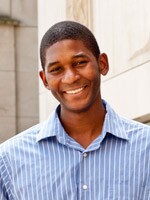
Kirabo Jackson’s tackles some of the most important questions in education today: What makes a good teacher? Do students benefit from attending “better” schools? What is the relationship between student demographic characteristics and teacher quality? Do extended public transit hours reduce drunk driving arrests and accidents? (ok, that’s not an education question--but interesting!)
At a time when education policymakers are especially focused on teacher quality, Jackson uses the tools of labor economics to look beyond what research already shows (teacher quality matters and teachers vary in quality) to investigate still unanswered questions about the factors that influence teacher quality--and that policymakers might be able to leverage to improve teaching and educational outcomes.
Jackson, 31, was raised in African and the Caribbean and attended boarding school in England before earning his bachelor’s degree from Yale and Ph.D. in economics from Harvard. An assistant professor at Northwestern University’s School of Education and Social Policy, he lives in Chicago. [.]How did you come to be an economist?
I started out being really interested in psychology. I’m generally interested in how things work, how people think, understanding interaction between individuals and society. But then I started taking a few economics courses and realized that economics addresses the same questions, but with greater formalism because economics uses numbers and speaks to policy. Economics can speak to power in a way psychology doesn’t.
Why focus on education?
I’m interested in education because it’s the lead to breaking out of negative cycles of poverty, at both the national and individual level. It’s one of the few things people can do to really improve their lives. If you have skills you can go and get a job and improve your life. It’s a mechanism for social justice.
That’s why I do economics of education.
In the field, economics of education is generally nestled in labor economics and public finance, and my work tends to be more on the labor economics side, because a lot of what I do is focused on teachers. And to study that you have to be interested in labor economics and to understand how labor markets function.
What research questions in education do you find most interesting?
A lot of research out there suggested that the most important component of school is the teachers. That’s why I focus a lot on teachers as opposed to other things about schools that seem more like window-dressing.
We have a good handle on the importance of teachers to student outcomes, but beyond that are a ton of questions we don’t have a good handle on:
What does a good teacher look like? A lot of research shows big differences in teacher quality but doesn’t give us a good sense of: What are they doing in classroom that makes them a good or bad teacher?
How do we actually create good teachers? How does someone who starts out with no experience or training become a fantastic teacher? What happens to them? What are the training experiences, the mechanisms, the policies, the schooling environments that make that happen? I want to know how that happens.
I’m interested in these questions not only as they relate to education but also because they relate to a really rich area of labor economics around how people develop skills.
What are your other research interests outside of education?
One area is social networks--how individuals are affected by people around them. In education, looking at how students are affected by classmates, how teachers are affected by their peers and school environment.
But this is also a topic outside of education. I have one paper coming out now on how taxi drivers are affected by their colleagues.
What experiences, individuals, or books have most influenced your thinking about education?
I had a very international upbringing. I was actually born outside of Chicago, but I grew up in the Caribbean and Africa because my dad worked for the United Nations. I lived in Sierra Leone and Tanzania for 10 years. And I’ve seen massive differences in welfare between people who have education and those who do not. It’s very tangible. If you don’t have a good education, there is a massive ceiling you can’t go beyond.
What do you see yourself doing 10 years from now?
Presumably I’ll be doing the same thing as now (but with tenure). Most people doing education research care about having an effect on policy. I’m no different in that regard. I could certainly see myself being more involved in policy decision-making or taking time to design interventions and influence policy, in addition to the research that is my main work.
What are some of your interests outside of work?
Martial Arts. I have a black belt in Tae Kwan Do. I also have a beagle mix puppy that I got from a rescue shelter.